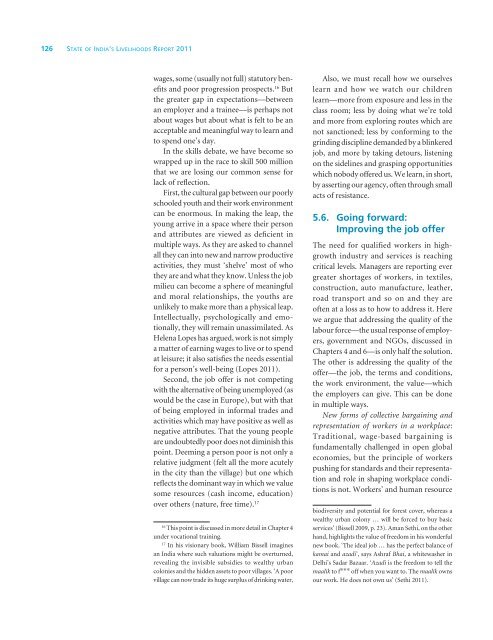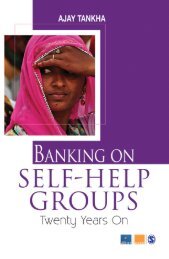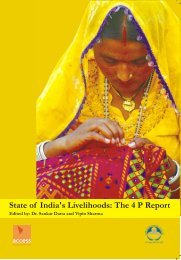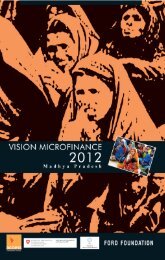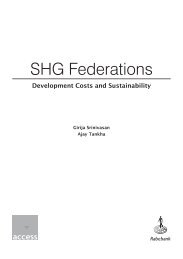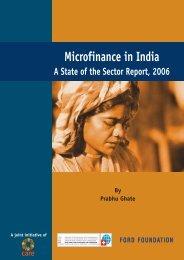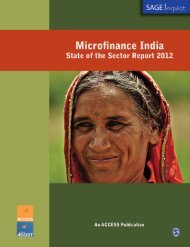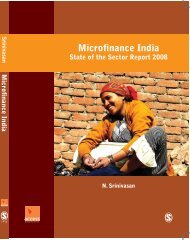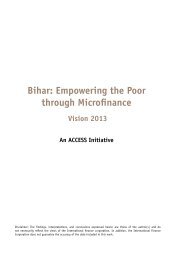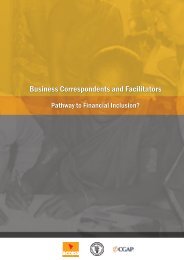SOIL Report 2011 - ACCESS Development Services
SOIL Report 2011 - ACCESS Development Services
SOIL Report 2011 - ACCESS Development Services
- No tags were found...
Create successful ePaper yourself
Turn your PDF publications into a flip-book with our unique Google optimized e-Paper software.
126 State of India’s Livelihoods <strong>Report</strong> <strong>2011</strong>wages, some (usually not full) statutory benefitsand poor progression prospects. 16 Butthe greater gap in expectations—betweenan employer and a trainee—is perhaps notabout wages but about what is felt to be anacceptable and meaningful way to learn andto spend one’s day.In the skills debate, we have become sowrapped up in the race to skill 500 millionthat we are losing our common sense forlack of reflection.First, the cultural gap between our poorlyschooled youth and their work environmentcan be enormous. In making the leap, theyoung arrive in a space where their personand attributes are viewed as deficient inmultiple ways. As they are asked to channelall they can into new and narrow productiveactivities, they must ‘shelve’ most of whothey are and what they know. Unless the jobmilieu can become a sphere of meaningfuland moral relationships, the youths areunlikely to make more than a physical leap.Intellectually, psychologically and emotionally,they will remain unassimilated. AsHelena Lopes has argued, work is not simplya matter of earning wages to live or to spendat leisure; it also satisfies the needs essentialfor a person’s well-being (Lopes <strong>2011</strong>).Second, the job offer is not competingwith the alternative of being unemployed (aswould be the case in Europe), but with thatof being employed in informal trades andactivities which may have positive as well asnegative attributes. That the young peopleare undoubtedly poor does not diminish thispoint. Deeming a person poor is not only arelative judgment (felt all the more acutelyin the city than the village) but one whichreflects the dominant way in which we valuesome resources (cash income, education)over others (nature, free time). 1716This point is discussed in more detail in Chapter 4under vocational training.17In his visionary book, William Bissell imaginesan India where such valuations might be overturned,revealing the invisible subsidies to wealthy urbancolonies and the hidden assets to poor villages. ‘A poorvillage can now trade its huge surplus of drinking water,Also, we must recall how we ourselveslearn and how we watch our childrenlearn—more from exposure and less in theclass room; less by doing what we’re toldand more from exploring routes which arenot sanctioned; less by conforming to thegrinding discipline demanded by a blinkeredjob, and more by taking detours, listeningon the sidelines and grasping opportunitieswhich nobody offered us. We learn, in short,by asserting our agency, often through smallacts of resistance.5.6. Going forward:Improving the job offerThe need for qualified workers in highgrowthindustry and services is reachingcritical levels. Managers are reporting evergreater shortages of workers, in textiles,construction, auto manufacture, leather,road transport and so on and they areoften at a loss as to how to address it. Herewe argue that addressing the quality of thelabour force—the usual response of employers,government and NGOs, discussed inChapters 4 and 6—is only half the solution.The other is addressing the quality of theoffer—the job, the terms and conditions,the work environment, the value—whichthe employers can give. This can be donein multiple ways.New forms of collective bargaining andrepresentation of workers in a workplace:Traditional, wage-based bargaining isfundamentally challenged in open globaleconomies, but the principle of workerspushing for standards and their representationand role in shaping workplace conditionsis not. Workers’ and human resourcebiodiversity and potential for forest cover, whereas awealthy urban colony … will be forced to buy basicservices’ (Bissell 2009, p. 23). Aman Sethi, on the otherhand, highlights the value of freedom in his wonderfulnew book. ‘The ideal job … has the perfect balance ofkamai and azadi’, says Ashraf Bhai, a whitewasher inDelhi’s Sadar Bazaar. ‘Azadi is the freedom to tell themaalik to f *** off when you want to. The maalik ownsour work. He does not own us’ (Sethi <strong>2011</strong>).


